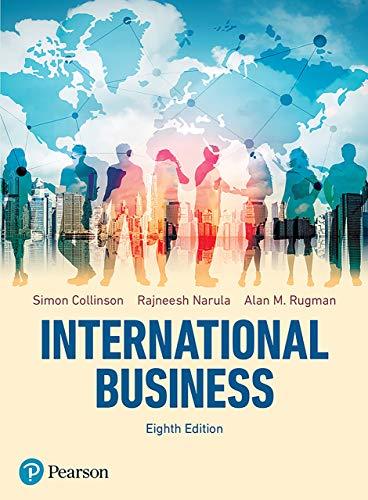China's fast growing economic and trade ties with a range of countries in Latin America and the
Question:
American governments but have not yet translated directly into inordinate leverage on the region's domestic policies.
The purpose of this is to assess whether China's growing economic and trade ties to Latin America and the Caribbean already represent or may translate into more assertive Chinese geopolitical influence in the region, particularly on issues relevant to the wider international liberal order championed by the United States. Given China's interest in protecting its system of authoritarian governance and state capitalism, which run counter to the dominant strain of liberal democracy in the region, it would not be surprising to find that its influence would have the effect of neutralizing, if not turning the LAC region against the international liberal order, to the detriment of U.S. leadership of the post-World War II system. On the other hand, China's traditionally soft approach to asserting its interests and values abroad, and its tendency to seek consensus or neutrality at the United Nations and other international fore, skew toward a more opportunistic set of relationships for both sides. Under this scenario, China would place a premium on building LAC support for more narrow interests like no recognition of Taiwan or Tibet, blocking international scrutiny of its human rights problems at home, and protection of economic assets and nationals. I conclude that, on balance, China and the United States implicitly may have reached a modus Vivendi in which they will continue to compete for attention and influence but will avoid direct conflict with each other in the region. In such a low-conflict environment, LAC states will continue to seek maximum advantage from both partners in accordance with their own interests.
To reach this conclusion, the first examine China's increasingly sophisticated pursuit of "win-win" policies grounded on the basic premise that LAC states value traditional definitions of sovereignty and noninterference as much as it does. I also look at what makes China an attractive partner for many LAC states and the broad palette of relationships under development. Second, I look at China and LAC attitudes toward the international liberal order and how they have shifted over the last decade. In particular, I assess the varied approaches to human rights and international law as well as to such transnational issues as Internet governance, climate change, and counternarcotics. The paper then returns to two older issues that predate the surge in China-LAC relations, namely relations with Taiwan and Cuba. Finally, I consider what the new China-LAC relationship means for the United States by positing various potential scenarios for increased tension or even conflict.
Fantastic news! We've Found the answer you've been seeking!
Step by Step Answer:
Related Book For 

International Business
ISBN: 9781292274157
8th Edition
Authors: Simon Collinson, Rajneesh Narula, Alan M. Rugman
Question Posted:





